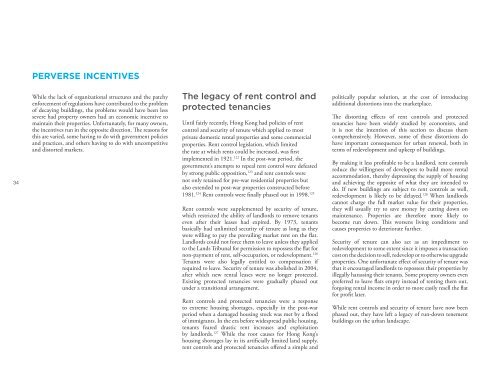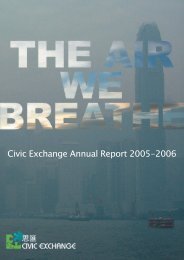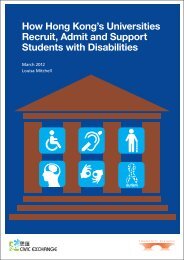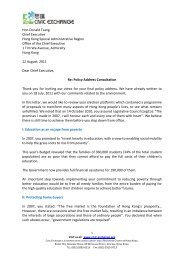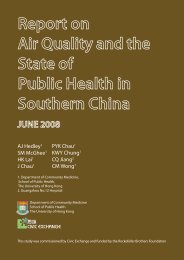Perverse Incentives34While <strong>the</strong> lack <strong>of</strong> organizational structures and <strong>the</strong> patchyenforcement <strong>of</strong> regulations have contributed to <strong>the</strong> problem<strong>of</strong> decaying buildings, <strong>the</strong> problems would have been lesssevere had property owners had an economic incentive tomaintain <strong>the</strong>ir properties. Unfortunately, for many owners,<strong>the</strong> incentives run in <strong>the</strong> opposite direction. The reasons forthis are varied, some having to do with government policiesand practices, and o<strong>the</strong>rs having to do with uncompetitiveand distorted markets.The legacy <strong>of</strong> rent control andprotected tenanciesUntil fairly recently, Hong Kong had policies <strong>of</strong> rentcontrol and security <strong>of</strong> tenure which applied to mostprivate domestic rental properties and some commercialproperties. Rent control legislation, which limited<strong>the</strong> rate at which rents could be increased, was firstimplemented in 1921. 122 In <strong>the</strong> post-war period, <strong>the</strong>government’s attempts to repeal rent control were defeatedby strong public opposition, 123 and rent controls werenot only retained for pre-war residential properties butalso extended to post-war properties constructed before1981. 124 Rent controls were finally phased out in 1998. 125Rent controls were supplemented by security <strong>of</strong> tenure,which restricted <strong>the</strong> ability <strong>of</strong> landlords to remove tenantseven after <strong>the</strong>ir leases had expired. By 1973, tenantsbasically had unlimited security <strong>of</strong> tenure as long as <strong>the</strong>ywere willing to pay <strong>the</strong> prevailing market rent on <strong>the</strong> flat.Landlords could not force <strong>the</strong>m to leave unless <strong>the</strong>y appliedto <strong>the</strong> Lands Tribunal for permission to repossess <strong>the</strong> flat fornon-payment <strong>of</strong> rent, self-occupation, or redevelopment. 126Tenants were also legally entitled to compensation ifrequired to leave. Security <strong>of</strong> tenure was abolished in 2004,after which new rental leases were no longer protected.Existing protected tenancies were gradually phased outunder a transitional arrangement.Rent controls and protected tenancies were a responseto extreme housing shortages, especially in <strong>the</strong> post-warperiod when a damaged housing stock was met by a flood<strong>of</strong> immigrants. In <strong>the</strong> era before widespread public housing,tenants feared drastic rent increases and exploitationby landlords. 127 While <strong>the</strong> root causes for Hong Kong’shousing shortages lay in its artificially limited land supply,rent controls and protected tenancies <strong>of</strong>fered a simple andpolitically popular solution, at <strong>the</strong> cost <strong>of</strong> introducingadditional distortions into <strong>the</strong> marketplace.The distorting effects <strong>of</strong> rent controls and protectedtenancies have been widely studied by economists, andit is not <strong>the</strong> intention <strong>of</strong> this section to discuss <strong>the</strong>mcomprehensively. However, some <strong>of</strong> <strong>the</strong>se distortions dohave important consequences for urban renewal, both interms <strong>of</strong> redevelopment and upkeep <strong>of</strong> buildings.By making it less pr<strong>of</strong>itable to be a landlord, rent controlsreduce <strong>the</strong> willingness <strong>of</strong> developers to build more rentalaccommodation, <strong>the</strong>reby depressing <strong>the</strong> supply <strong>of</strong> housingand achieving <strong>the</strong> opposite <strong>of</strong> what <strong>the</strong>y are intended todo. If new buildings are subject to rent controls as well,redevelopment is likely to be delayed. 128 When landlordscannot charge <strong>the</strong> full market value for <strong>the</strong>ir properties,<strong>the</strong>y will usually try to save money by cutting down onmaintenance. Properties are <strong>the</strong>refore more likely tobecome run down. This worsens living conditions andcauses properties to deteriorate fur<strong>the</strong>r.Security <strong>of</strong> tenure can also act as an impediment toredevelopment to some extent since it imposes a transactioncost on <strong>the</strong> decision to sell, redevelop or to o<strong>the</strong>rwise upgradeproperties. One unfortunate effect <strong>of</strong> security <strong>of</strong> tenure wasthat it encouraged landlords to repossess <strong>the</strong>ir properties byillegally harassing <strong>the</strong>ir tenants. Some property owners evenpreferred to leave flats empty instead <strong>of</strong> renting <strong>the</strong>m out,forgoing rental income in order to more easily resell <strong>the</strong> flatfor pr<strong>of</strong>it later.While rent controls and security <strong>of</strong> tenure have now beenphased out, <strong>the</strong>y have left a legacy <strong>of</strong> run-down tenementbuildings on <strong>the</strong> urban landscape.
Lack <strong>of</strong> FinancingOne significant problem is <strong>the</strong> lack <strong>of</strong> mortgage financingavailable to owners <strong>of</strong> older properties. Hong Kong’s bankslend very conservatively in <strong>the</strong> mortgage market and aregenerally reluctant to <strong>of</strong>fer mortgages on properties over10-20 years <strong>of</strong> age. They require both a higher downpayment and impose a shorter repayment period. Thestandard formula used by banks stipulates that <strong>the</strong> mortgagerepayment period + <strong>the</strong> age <strong>of</strong> <strong>the</strong> building should notexceed 40 years. Therefore, someone buying 30-year-oldproperty would only have 10 years in which to repay <strong>the</strong>mortgage. Additionally, while someone who purchasesa new property can obtain a mortgage on up to 95% <strong>of</strong><strong>the</strong> property’s value (partly subsidized by <strong>the</strong> Hong KongMortgage Corporation’s Mortgage Insurance Scheme), aperson trying to buy an older property is likely to be <strong>of</strong>fereda much smaller loan. Ian Brownlee, who attempted toobtain a mortgage after his 1951 block <strong>of</strong> flats was privatelyrehabilitated discovered that banks were only willing to<strong>of</strong>fer a 50% mortgage.The effect is that this makes it difficult for owners <strong>of</strong>older properties to obtain <strong>the</strong> financing needed for repairthrough remortgaging. It also makes older properties lessattractive to individual buyers since <strong>the</strong>y require such alarge down payment, <strong>the</strong>reby reducing <strong>the</strong> flat’s resalevalue. This fur<strong>the</strong>r discourages owners from spending onmaintenance. These problems are recognized by <strong>the</strong> URA,which has introduced a preferential mortgage scheme forbuildings rehabilitated under its own programmes. 17banks have agreed to participate and <strong>of</strong>fer rehabilitatedproperties a standard 70% mortgage on <strong>the</strong> property value,interest rates comparable to a 10-year-old building, and arepayment term <strong>of</strong> 55 years minus <strong>the</strong> age <strong>of</strong> <strong>the</strong> building.Additionally, <strong>the</strong> Hong Kong Mortgage Corporation(HKMC) has agreed to <strong>of</strong>fer mortgage insurance equivalentto 15% <strong>of</strong> <strong>the</strong> property value, bringing <strong>the</strong> total mortgageup to 85%. This places rehabilitated buildings roughly onpar with a 10-year-old building on <strong>the</strong> secondary marketbut still does not approach <strong>the</strong> terms a borrower can obtainfor a new property. The programme is limited in scope— only buildings rehabilitated by <strong>the</strong> URA are eligible.Private owners who rehabilitate buildings on <strong>the</strong>ir own areexcluded.Why are banks unwilling to finance older properties? Onlypart <strong>of</strong> <strong>the</strong> answer has to do with <strong>the</strong> buildings <strong>the</strong>mselves.With an assumption that buildings were made to lastonly 50 years, banks are reluctant to accept a property ascollateral if <strong>the</strong>y are not sure if it will still be standing when<strong>the</strong> mortgage payment period ends. If <strong>the</strong> buyer defaults and<strong>the</strong> property is foreclosed upon, banks are concerned aboutwhe<strong>the</strong>r <strong>the</strong> building will be in a good enough conditionto be worth <strong>the</strong> remaining value <strong>of</strong> <strong>the</strong> mortgage. 129 Sincebanks cannot accurately gauge a property’s condition orlevel <strong>of</strong> maintenance, <strong>the</strong>y rely on a simple and conservativeage-based formula to minimize uncertainty. O<strong>the</strong>r countriessuch as <strong>the</strong> UK overcome this problem by requiring olderbuildings to be surveyed and certified structurally soundbefore a mortgage is approved. 130 No such scheme currentlyexists in Hong Kong.The larger issue is <strong>the</strong> structure <strong>of</strong> <strong>the</strong> banking industry.Hong Kong’s banking industry is heavily reliant on <strong>the</strong>property sector. Between 2003 and 2008, loans for propertydevelopment and construction (including residential,commercial and industrial property) made up 24% <strong>of</strong> loansmade to all economic sectors. When one includes <strong>the</strong> value<strong>of</strong> private residential mortgages in this figure, property canbe said to represent between 51% <strong>of</strong> <strong>the</strong> value <strong>of</strong> all loansmade in Hong Kong. 131 Banks rely on making large loansto developers, followed by supporting buyers <strong>of</strong> <strong>the</strong> newlyconstructed developments. This means that <strong>the</strong>y have moreincentive to <strong>of</strong>fer favourable loan terms on new propertiesthan on old ones, because this ensures that developerswill be able to sell <strong>the</strong>ir units and pay back <strong>the</strong>ir loans. 132Smaller banks are unable to fill <strong>the</strong> gap in financing oldproperties because <strong>the</strong>y lack large enough deposit bases to<strong>of</strong>fer mortgages competitively, as nei<strong>the</strong>r developers nor<strong>the</strong> government place deposits with <strong>the</strong>m. 133 As developerssell <strong>the</strong>ir properties through agents, agents also have anincentive to promote primary sales over secondary sales.Economic historians have written about <strong>the</strong> symbioticrelationship that evolved between major developers andbig banks in Hong Kong. In 1979 HSBC <strong>of</strong>fered CheungKong Holdings chairman Li Ka-shing a special untenderedbargain <strong>of</strong>fer to purchase Hutchinson Whampoa, whichcemented Li’s economic rise and gained <strong>the</strong> bank anextremely loyal and very large client. 134 The concentratedHong Kong property industry generates such large pr<strong>of</strong>itsthat although HSBC is now a global bank, Hong Kong, asingle city <strong>of</strong> 7 million people, contributed 23.5% and 30%to its global pr<strong>of</strong>its in 2006 and 2007 respectively — morethan <strong>the</strong> rest <strong>of</strong> <strong>the</strong> Asia Pacific put toge<strong>the</strong>r. 135Some bankers argue that government regulations andpolicies have exacerbated <strong>the</strong> situation, particularly thoseimplemented in <strong>the</strong> aftermath <strong>of</strong> <strong>the</strong> Asian Financial Crisis<strong>of</strong> 1997 in order to prop up <strong>the</strong> property sector. Conservativelending rules date back to <strong>the</strong> early 1990s, when <strong>the</strong> HongKong Mortgage Authority (HKMA), fearing speculativeinstability, established a non-statutory guideline requiringbanks to <strong>of</strong>fer no more than a 70% loan on <strong>the</strong> value <strong>of</strong>a residential property. It also required a minimum 10%deposit. 136 These rules were initially tightened during <strong>the</strong>1997 Financial Crisis as <strong>the</strong> government and banks worriedabout mortgage defaults.With <strong>the</strong> fur<strong>the</strong>r collapse <strong>of</strong> property prices, <strong>the</strong> governmentdecided to create <strong>the</strong> HKMC to support <strong>the</strong> mortgagemarket. In 1998, <strong>the</strong> HKMC began <strong>of</strong>fering an additional15% in mortgage insurance, and halved <strong>the</strong> deposit35
- Page 7: The Local Context:Evolving Communit
- Page 10 and 11: Hong Kong Urban Design ConcernsHong
- Page 12 and 13: 12In 1998, the Planning Department
- Page 14 and 15: Part I:14The URA —A Redevelopment
- Page 16 and 17: Version 2:The Urban RenewalAuthorit
- Page 18 and 19: URA Ordinance vs.Urban Renewal Stra
- Page 20 and 21: How The URA WorksThe Cycle ofResump
- Page 22 and 23: PART II:22The PoliticalEconomyof th
- Page 24 and 25: The Institutional ContextNationaliz
- Page 26 and 27: 26traditionally given the Lands Dep
- Page 28 and 29: 28maximum allowable plot ratio —
- Page 31 and 32: Left: Multi-ownership with inadequa
- Page 33: Weak building maintenanceregulation
- Page 37 and 38: Left: Graham Streetrequirement. 137
- Page 39 and 40: Left: Graham Streetthe 1970s to ind
- Page 41 and 42: From the point of view of private d
- Page 43 and 44: The Built EnvironmentPart I discuss
- Page 45 and 46: Left: The K11 shopping mall, hotel,
- Page 48 and 49: Box 4Calculating Plot RatioPlot rat
- Page 50 and 51: 50Standardized ArchitectureStandard
- Page 53 and 54: Left: Langham Place, blank facade o
- Page 56 and 57: 56Figure-ground diagram of Langham
- Page 58 and 59: 58This page: Footbridge network ove
- Page 61: Left: Wo Tik Street - the only acti
- Page 65 and 66: Public Open Spaces and Pedestrian P
- Page 67 and 68: The MertonThe Merton in Kennedy Tow
- Page 69 and 70: Left: The widened pavement along Sh
- Page 71 and 72: Langham PlaceThere are often paveme
- Page 73 and 74: Recreational Public Open SpacesQuan
- Page 75: Hanoi Road K11 Open SpaceSize: 1,20
- Page 78 and 79: 78Clockwise from left: The ground f
- Page 81 and 82: The MertonTotal size (sites A and B
- Page 83 and 84: General ObservationsLandscapingGene
- Page 85:
The URA also announced that it had
- Page 88 and 89:
Box 6The Counterproductive Pursuito
- Page 91 and 92:
Opposite, clockwise from top right:
- Page 93 and 94:
Social ImpactSocially sustainable d
- Page 96 and 97:
Left: Western Market has become pri
- Page 98 and 99:
98This spread from left: This anony
- Page 100 and 101:
Top: A naturally gentrified street
- Page 102 and 103:
102Comprehensive redevelopment disp
- Page 104 and 105:
104Luxury shopping at the K11 mall
- Page 106 and 107:
106A building rehabilitated by the
- Page 108 and 109:
According to town planner Ian Brown
- Page 110 and 111:
110
- Page 112 and 113:
112Wan Chai Market. Built in 1937,
- Page 114 and 115:
114
- Page 116 and 117:
116
- Page 118 and 119:
118Conclusion
- Page 120 and 121:
120
- Page 122 and 123:
Appendix 1Name of projectAddress/lo
- Page 124 and 125:
Name of projectAddress/locationArea
- Page 126 and 127:
126Endnotes1 HKSAR Planning Departm
- Page 128 and 129:
128110 Chan, B. W. (2002), “The h
- Page 130:
Room 701, Hoseinee House,69 Wyndham


